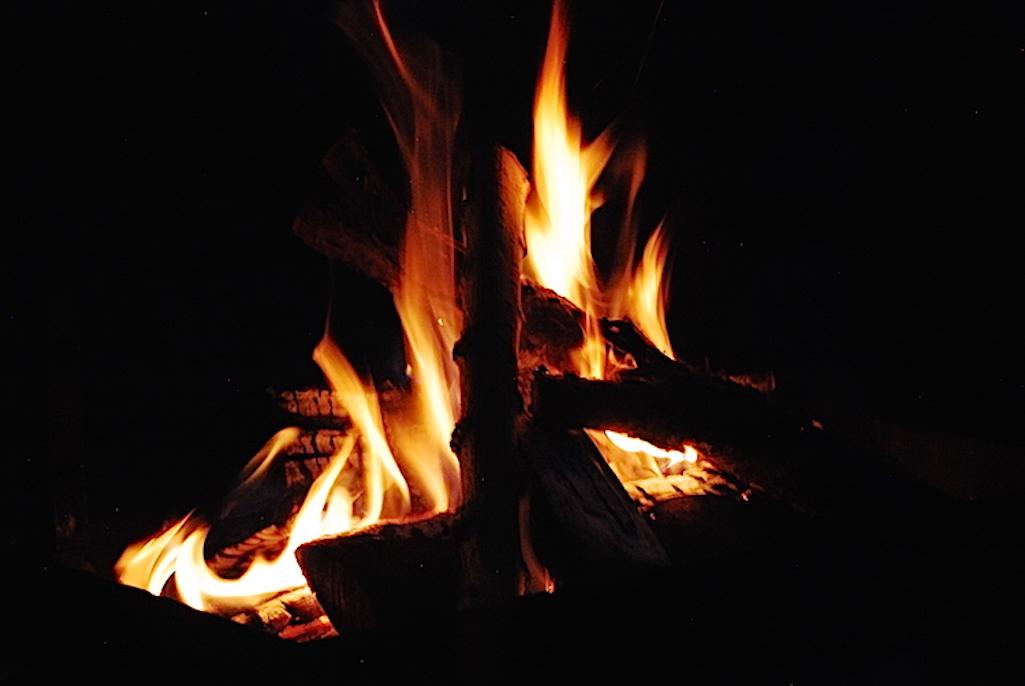
Nice campfire, but how good is its smoke for you?/Kurt Repanshek file
Campfires have been part of camping in the National Park System forever, most likely. There certainly were campfires in the area we now know as Yellowstone National Park before it was a park. But is the smoke from campfires good for you?
Smoke from one small campfire probably isn't terrible for you, unless you sit immediately downwind of the flames. But, what about those campgrounds with dozens and dozens of campsites, each one with its own fire ring?
During a recent stay at the Fruita Campground in Capitol Reef National Park many of those fire rings got used. When the sun went down, the dancing flames, and their choking smoke, went up. For the next five or six hours the smoke swirled and blew and at times downright stunk (especially when people doused the flames with water; a good thing, but the smell is not so good.)
Being directly downwind of two of those campsites with campfires, we ate, smelled, and suffered through a lot of smoke during our two nights there. Not fun. And when the winds kicked up with gusts that seemed to reach 25-35 mph, I worried about flying sparks melting holes in our tent, or even setting a real wildfire.
Recently there have been stories in the news about the pollutants carried in the smoke from last year's wildfires in the West. One just came out last week from the University of California at Berkeley, and said:
Wildfire smoke can trigger a host of respiratory and cardiovascular symptoms, ranging from a runny nose and cough to a potentially life-threatening heart attack or stroke. A new study suggests that the dangers posed by wildfire smoke may also extend to the largest organ in the human body and our first line of defense against outside threat: the skin.
“Existing research on air pollution and health outcomes has focused primarily on cardiac and respiratory health outcomes, and understandably so. But there is a gap in the research connecting air pollution and skin health,” said study lead author Raj Fadadu, a student in the UC Berkeley-UCSF Joint Medical Program. “Skin is the largest organ of the human body, and it’s in constant interaction with the external environment. So, it makes sense that changes in the external environment, such as increases or decreases in air pollution, could affect our skin health.”
Other studies have pointed out the bad health effects wood smoke causes on youngsters' respiratory systems, raised questions about the health impacts of bacteria and fungi carried into the air smoke from fires, and claimed wood smoke is worse for you than your car's exhaust.
Now, imagine if your lungs are comprised for some reason, or you have heart issues, or both. Do you pitch your tent or park your RV in a campground where you might fall to sleep with dozens, or possibly more than 100, campfires flickering outside your thin tent walls or RV? Sure, it's not like a 10,000-acre wildfire bellowing smoke, but at times the campground smoke can hover in place.
We're searching for specific studies on the health effects of campground campfire smoke and will relay them if we find any, but in the meantime, what do you think about campfire smoke in national park campgrounds.



Comments
My husband loves to build a campfire and it has been part of our camping experience for decades. However because of its effect on humans and the environment, it's time to stop this activity.
No fire. No camp
This tradition of needing campfires is just that, a tradition. IMO it should be curtailed. I would be very supportive of a campground that is "non-smoking" and "non-campfires". Some have respiratory conditions sensitive to irritants like this.
I can easily do without a campfire while camping.
I would like to see one central camp fire or fire spot. Bring your chairs or have them set up with benches etc., allow adult beverages and it would make it more enjoyable for all. Let a Ranger tend it. This would also cut down on wildfires started accidentally and general junk around a camp site fire. Allow people to cook etc. too. Make it more like one of those ranch experiences. The Park is then in control. Less stress for Rangers, park service and visitors.
I love camp fires but dislike smelling like smoke, tending the fire, starting and putting it out and finding all the wood for it. I understand people's health issues but camping isn't normal without a fire to me.
if the NPS uses my idea please let me know so I can expand on it and credit where it's due.
we love our campfires in the evening. We ususly cook on the fire and the fire keeps us warm before crawling into the tent. A little smoke is nothing compared to the stuff we breath at work. Not convinced a little smoke is a big deal. A nice hot fire burns somewhat clean no fires would make evenings seem long. I think generators are more annoying.
I am done. Want to buy my 1965 Airstream? Would love a campfire and to smell my neighbors.
I know camp fires in the great outdoors seems like a right of passage. As a lover ouf nature...all our local, state and National parks! This summer we will be in Glacier and Yellowstone. So maybe we need to rethink this. Too many risks! Sooo many people will be outdoors and parks all maxed out!? So often campfires go out of control, the smoke could be toxic with so many campfires at once...and then the enduring smell you cannot excape! Hope their are ways to police this for our overburdened park rangers!? Would just prefer to smell clear night air of pine and nature! No skunk either please!